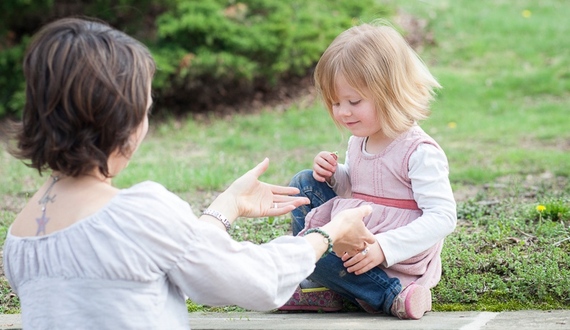
You know that look on their faces, the look when you've just snapped at them? We moms universally hate that look. It tells us that we've let them down.
We want to be less irritable with our children. We want to be able to respond like a zen master rather than react like a troll. Anger flare-ups not only hurt our relationship with our child, but we end up disappointed in ourselves. Ugh.
We know that we'd like to be more zen, and less Rosanne Barr, but how?
Over the next five posts, I'm going to expand upon these five simple things we can do to be less irritable with our kids. In depth. So that you can have a full & complete understanding.
Ready? Let's go.
The first simple thing we can do is so cliche as to make us completely overlook it: Pause and breathe.
I know, I know! The thing is, everyone says it for a reason. It works.
It's been proven to work both by ancient sages and by modern day scientists. Let's look at why it works and ways to apply this to your busy life.
Why it works
Breathing is a very special and unique bodily function in that is both voluntary and involuntary. Other major functions, like blood flow and digestion, work completely on their own and are managed by the unconscious mind.
While breathing is also controlled by the unconscious mind, we can also take control of our breath at any time. We can make our breath shallow and fast or deep and slow, changing how it affects our bodies.
Yogis have known this for years and emphasize slow, deep breathing. Yoga postures bring us into poses that might trigger a stress response in the body as we hold this challenging shape. Then a good teacher will lead you into deep, slow breathing to bring your body out of the stress response and into the rest and relax response.
Managing stress is the most direct application of conscious, deep breathing. And we have plenty of stress as parents. We human beings are wired to react defensively to threats in our environment. Your panicked reaction to your three-year-old's tantrum? It is your innate stress response.
Just like the yogis, we can shift our body from the stress response to the rest and relax response with conscious, deep breathing. We can decrease our elevated heart rate, lower our elevated blood pressure, and ease our muscle tension simply with breathing.
How to bring this into your life
Practice conscious, deep breathing right now: (1) inhale deeply through the nose for a count of five or so, making sure that the belly expands, (2) hold the breath for a moment, and (3) exhale completely through the mouth for a count longer than the inhalation. Do this three times.
How do you feel? A lot more relaxed, I'm willing to bet!
The beauty of this practice is that it's easy to integrate into your daily life. The difficult part is to remember to do it.
Place sticky-note reminders around your home to remind you to take those three deep breaths. One of them may even catch your eye before you rant at your kids.
Place a reminder in your car to pause and practice those three deep breaths before driving anywhere.
Place a reminder at your bedside table to begin the day with 30 seconds of conscious breathing, meaning- just sit there and deliberately pay attention to feeling your inhales and exhales. Start and end each day this way for a month and you will see a shift in your levels of irritability.
Take moments to pause and breathe while you are waiting for your tea water to boil, before you pick up your kids from school, before you speak to your child. Pick some place in your day to pause and breathe deeply. Practice it every day.
When you integrate this into your day and practice, you will build a new, positive habit.
You will literally be strengthening the neural pathways of peace rather than frustration and anger. It's not an overnight change, but a bit-by-bit kind of thing. It takes dedication and practice above all.
Go get your sticky notes now. Practice pausing and breathing this week. Then jump into the comments below, and let me know how it goes!
